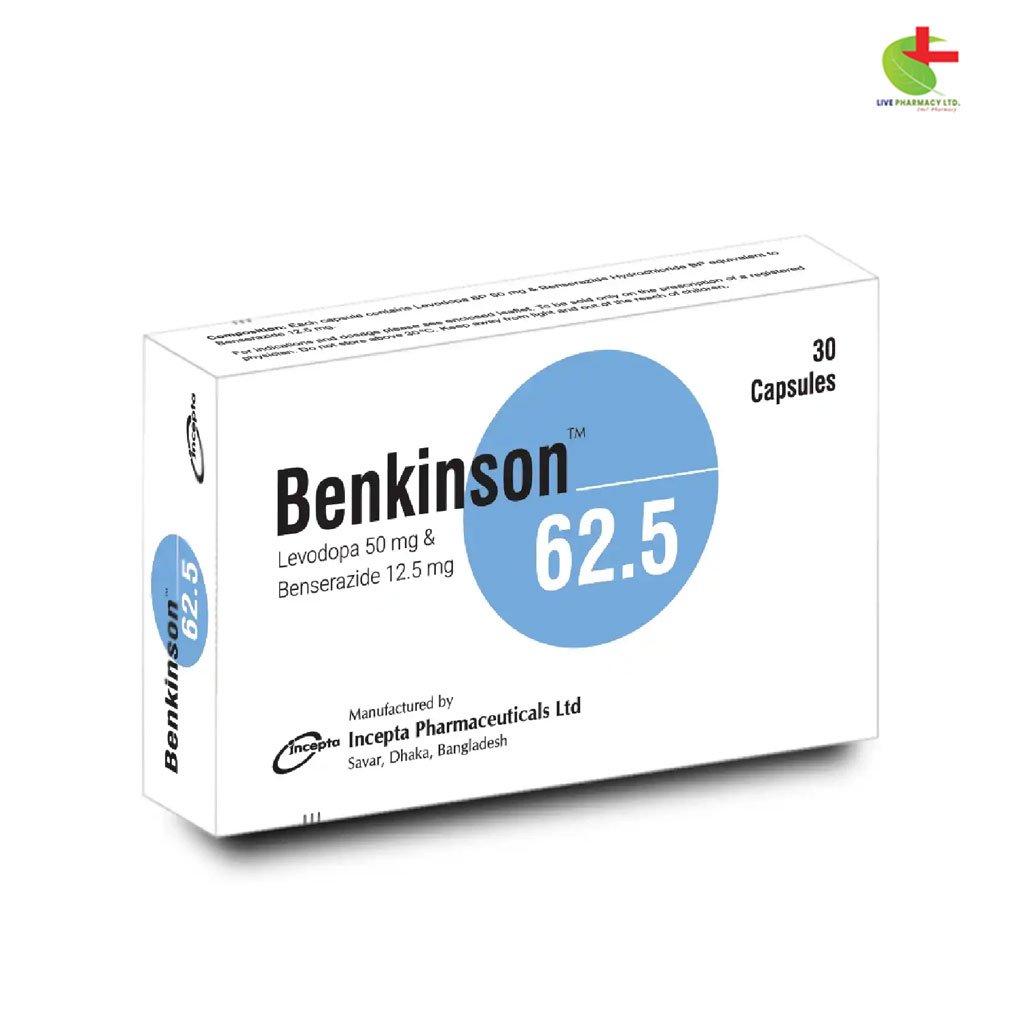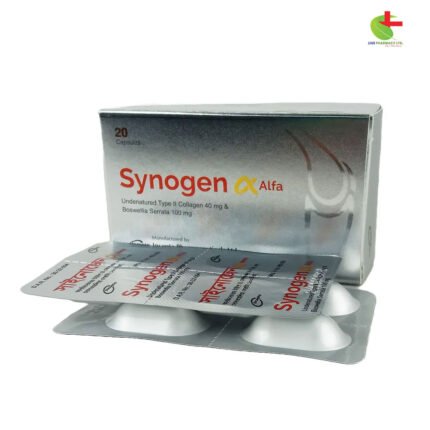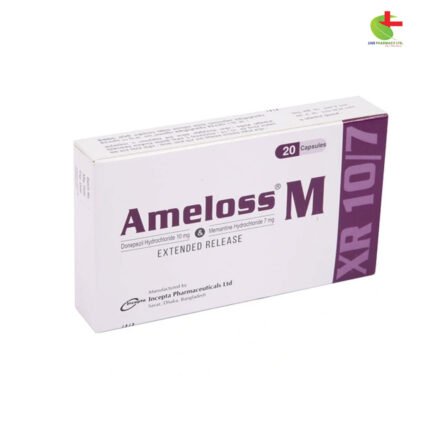Benkinson 62.5
80.00৳ Strip(10)
- Levodopa-Benserazide capsule is used for the treatment of Parkinson’s disease, including motor fluctuations and nocturnal symptoms.
- The combination of levodopa (dopamine precursor) and benserazide helps increase dopamine levels by inhibiting peripheral decarboxylation.
- Available in both immediate-release and controlled-release formulations for optimized symptom control.
- Recommended use under the guidance of a healthcare professional to ensure effective treatment and manage potential side effects.
 Brand
Brand
|
Incepta Pharmaceuticals Ltd |
|---|---|
 Generics
Generics
|
Levodopa + Benserazide |
 Type
Type
|
Capsule |
Indications
This immediate-release capsule is prescribed for managing all types of Parkinson’s syndrome, excluding drug-induced Parkinsonism. The controlled-release capsule is specifically indicated for patients experiencing various motor fluctuations, particularly those related to plasma level changes, such as “peak dose dyskinesia” and “end of dose deterioration.” It is also recommended for improved control of nocturnal symptoms.
Note: Use as directed by a registered healthcare professional.
Pharmacology
This medication acts as an anti-Parkinson’s agent. Levodopa, a dopamine precursor, is utilized as a prodrug to enhance dopamine levels. Unlike dopamine, which cannot cross the blood-brain barrier, levodopa can enter the central nervous system, where it is metabolized into dopamine by the enzyme aromatic L-amino acid decarboxylase. However, levodopa undergoes rapid decarboxylation in both cerebral and peripheral tissues, leading to suboptimal availability in the basal ganglia and causing peripheral side effects. To minimize these issues, levodopa is combined with benserazide, a peripheral decarboxylase inhibitor. The optimal ratio of levodopa to benserazide in this formulation is 4:1, proven effective in clinical trials, delivering results comparable to higher doses of levodopa alone.
Dosage & Administration
For Immediate-Release Capsule (IR):
- Parkinson’s Disease
- Initial Dose:
- Early stage: Levodopa-Benserazide (50+12.5) 62.5 mg, 1-2 times/day
- Elderly: Levodopa-Benserazide (50+12.5) 62.5 mg, 1-2 times/day
- Maintenance Dose:
- Adult: Levodopa-Benserazide (50+12.5) 62.5 mg, 3-4 times/day
- Advanced stage: Levodopa-Benserazide (100+25) 125 mg, 3 times/day
- Patients previously on levodopa: Start with 10-15% of the prior dose
- Patients switching from other combination therapies: Discontinue previous medication for 12 hours, then start with Levodopa-Benserazide (50+12.5) 62.5 mg, 3-4 times/day
- Initial Dose:
For Controlled-Release Capsule (CR):
- Parkinson’s Disease with Motor Fluctuations
- Initial Dose:
- Start with Levodopa-Benserazide (100+25) 125 mg controlled-release capsule, 3 times/day
- Maximum Dose:
- Up to 6 capsules per day
- Patients transitioning from IR capsules: Replace every 100 mg of levodopa with one controlled-release capsule, adjusting dosage frequency accordingly. Increase dose every 2-3 days based on patient response.
- Initial Dose:
Renal & Hepatic Considerations:
- Renal Impairment: No dose adjustments necessary for mild or moderate renal insufficiency.
- Hepatic Impairment: Safety and efficacy in patients with liver impairment have not been established.
Note: Always follow the guidance of a registered healthcare professional.
Drug Interactions
Levodopa-Benserazide capsules may interact with various medications, including neuroleptics, opioids, and antihypertensive drugs containing reserpine, which can reduce the effectiveness of levodopa. Concomitant use with sympathomimetic agents (e.g., adrenaline, isoproterenol) should be monitored closely due to potential cardiovascular effects. Antipsychotics, especially D2-receptor antagonists, may reduce the antiparkinsonian effects. Discontinue this medication 12-48 hours before any surgical procedures requiring halothane anesthesia due to risks of blood pressure fluctuations and arrhythmias.
Contraindications
This combination therapy is contraindicated in patients with known hypersensitivity to levodopa, benserazide, or any of its components, as well as in individuals taking non-selective MAO inhibitors (due to hypertensive crisis risk). Caution is advised for patients with endocrine, renal, or hepatic dysfunction, cardiac disorders, psychiatric conditions with psychosis, glaucoma, or those with a history of melanoma. Not recommended for individuals under 30 years old or those with Huntington’s chorea or intention tremor.
Side Effects
Common side effects may include anxiety, appetite loss, arrhythmias, depression, diarrhea, hallucinations, movement disorders, nausea, postural hypotension, sleep disturbances, altered taste, vomiting, and leucopenia.
Pregnancy & Lactation
- Pregnancy Category B3: This medication is contraindicated during pregnancy and in women who are not using adequate contraception. If pregnancy occurs while on treatment, discontinue the drug immediately.
- Lactation: The safety of this medication during breastfeeding has not been established.
- Use in Children: Contraindicated for individuals under 30 years old.
Precautions & Warnings
Patients with a history of Cushing’s syndrome, diabetes, endocrine disorders, convulsions, myocardial infarction with arrhythmia, peptic ulcers, hyperthyroidism, osteomalacia, pheochromocytoma, psychiatric illnesses, severe cardiovascular or pulmonary disease, and angle-closure glaucoma should use this medication with caution.
Overdose Effects
In the event of an overdose, monitor vital signs closely and administer supportive treatment for cardiovascular or central nervous system effects as necessary. Prevent further absorption of the controlled-release formulation using an appropriate method.
Therapeutic Class
Antiparkinson drugs
Storage Conditions
Store below 30°C, in a dry place, away from light and moisture. Keep out of the reach of children.













Reviews
There are no reviews yet.